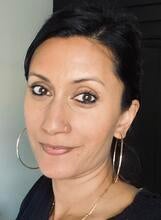A $129,000 (£100,000) grant will allow artists from the United Kingdom and South Asia to share artistic practices and exchange ideas and experiences regarding equity in the British South Asian dance sector.
Anusha Kedhar, associate professor with the Department of Dance, along with two other dance scholars from the United Kingdom, Prarthana Purkayastha, from the Royal Holloway University London, and Royona Mitra from Brunel University, received the grant from the UK’s Arts and Humanities Research Council for their project titled “South Asian Dance Equity (SADE): The Arts British South Asian Dance Ignores.”
“This project, a first step towards making the South Asian dance sector in Britain more equitable, will allow us to identify key areas of inequity in British South Asian dance so that resources and opportunities can be better directed to those most marginalized within the sector,” said Kedhar, who also serves as the department’s graduate advisor. “It will also create space for marginalized South Asian artists from the UK and South Asia to be in conversation about their experiences and start to build transnational artist networks.”
The grant also allows Kedhar to build on the arguments she presents in her book, “Flexible Bodies: British South Asian Dancers in an Age of Neoliberalism,” to explore how uneven power structures and systemic inequities operate not just on, but also within South Asian dance in Britain.
Kedhar said that in collaboration with key South Asian arts organizations, Akademi in London, Baithak UK in London, Sampad Arts in Birmingham, Balbir Singh Dance Company in Leeds, and Nupur Arts in Leicester, SADE, of which she is co-investigator, will organize five workshops foregrounding the works of minoritized artists, including non-Hindu and non-Indian/heritage artists, LGBTQI+ artists, caste-oppressed artists, disabled artists, and folk and Adivasi (indigenous) arts and artists.
“These groups have been historically marginalized owing to stigma, oppression, legislation, and social stratification. In addition, the workshops will bring together key stakeholders in the UK, including arts organizations, programmers, curators, funders, scholars, and policy makers, to be in dialogue about equity,” Kedhar said. “The project will culminate in a two-day conference at The Place Theatre in London, another project partner, with panels, keynote speakers, and plenaries as well as performance sharings by the artists who participated in the workshops.”
